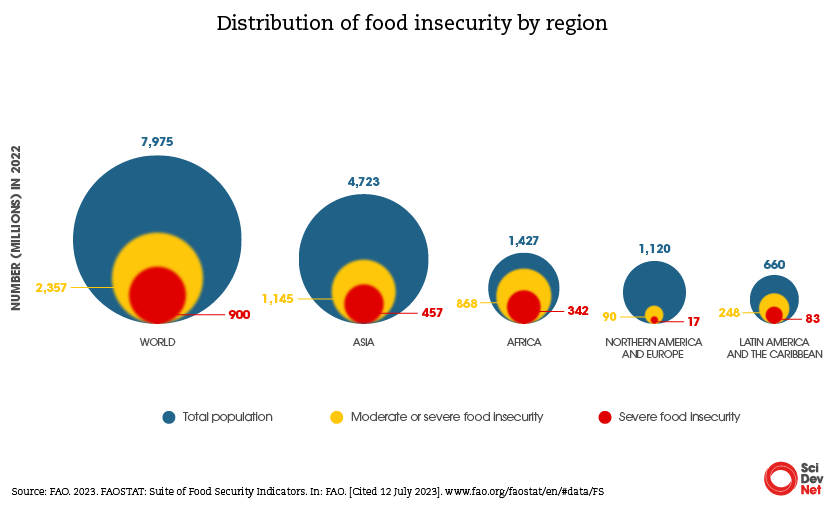Funding gap to tackle world’s hunger crises widens
[NAIROBI] The shortfall of international funding for countries with crisis levels of hunger has widened by almost a quarter in the last year, according to analysis by the non-profit organisation Action Against Hunger.
Nearly one in every four people on earth are stricken by hunger, driven mainly by conflict, climate change and chronic inequality, according to a report released to coincide with the World Economic Forum in Davos, Switzerland, this week.
However, 65 per cent of funding requests were unmet for countries most in need, according to the NGO’s Hunger Funding Gap Report – a 23 per cent increase on the previous year.
“While ending hunger seems like an unsurmountable task on the face of it, you are talking a very small fraction, just 0.3 per cent, of the value of the world economy.”
Zia Mehrabi, food systems researcher, University of British Columbia
Michelle Brown, associate director of advocacy at Action Against Hunger, said some of the world’s biggest donor countries were expecting to slash their aid budgets in 2024.
“Rates of severe hunger continue to increase,” she told SciDev.Net.
“Needs are greater, yet humanitarian funding levels are on the decline.
“This means that we will potentially see far greater humanitarian needs in the coming years since peoples’ resilience to shocks will be eroded.”
Globally, 783 million people—more than the population of EU and the US combined—suffer from hunger, according to the report, published on 16 January. This represents an increase of 122 million from pre-COVID-19 levels, it says.
The authors identified 17 countries that experienced “crisis” levels of hunger or worse in 2022 and analysed how much funding those countries subsequently received in 2023 in response to hunger appeals.
The countries were: Afghanistan, Burundi, Central African Republic, Democratic Republic of Congo, Guatemala, Haiti, Honduras, Kenya, Lebanon, Madagascar, Malawi, Mozambique, Pakistan, Somalia, South Sudan, Sudan, and Yemen.
No appeals for either ongoing or emergency hunger-related programmes were wholly met, according to the researchers, while only 12 per cent received more than half of the financial resources required.
Food systems transformation
Responses to these appeals go beyond simply dishing out food aid, Action Against Hunger stressed.
“We need multisectoral responses to support access to basic services like healthcare and clean water, as well as ending conflicts and ensuring humanitarian access and addressing climate change,” added Brown.
“Agriculture support and food systems transformation are extremely important in addressing the global hunger crisis.”
The researchers estimate it would take US$8.86 billion to fully fund the hunger-related appeals of the 17 countries included in the report.
In addition to these crises, the World Food Programme warns of a looming famine in Gaza, with about 2.2 million people suffering crisis or worse levels of food insecurity as a result of the conflict there.
UN Secretary General Anthony Guterres used his address at the World Economic Forum on Wednesday to repeat his calls for a humanitarian ceasefire in the Palestinian enclave.
The World Food Programme, the world’s leading organisation for distributing humanitarian food aid, had a 60 per cent funding shortfall in 2023. It says that each one per cent reduction in its funding could push another 400,000 people closer to famine.

Zia Mehrabi a food systems, climate change and agricultural technology researcher at the University of British Columbia in Canada, said ending hunger was an achievable goal.
“You are talking an investment of around US$300 billion per year into a range of policy actions including agricultural R&D, trade, infrastructure, inputs, extension services, early warning, debt alleviation, social protections,” he told SciDev.Net.
“To put this in perspective, global GDP was US$105 trillion in 2023. So, while ending hunger seems like an unsurmountable task on the face of it, you are talking a very small fraction, just 0.3 per cent, of the value of the world economy.”
This amount is roughly the size of the global pet industry, or less than 15 per cent of global military expenditure, adds Mehrabi.
“This isn’t really an issue of evidence or data, it is an issue of political will,” he added.
Charles Owubah, CEO of Action Against Hunger USA, also said resolve was lacking to deliver on the UN Sustainable Development Goal of zero hunger by 2030.
These issues featured on the agenda at Davos on Wednesday, with a session on “Revolutionising Food Security”.
“I applaud the World Economic Forum for keeping hunger on the global agenda,” Owubah said, adding: “Now, we must follow the conviction of our conscience with greater action after meetings end.”
This article was produced by SciDev.Net’s Global edition.
Legal Disclaimer:
EIN Presswire provides this news content "as is" without warranty of any kind. We do not accept any responsibility or liability for the accuracy, content, images, videos, licenses, completeness, legality, or reliability of the information contained in this article. If you have any complaints or copyright issues related to this article, kindly contact the author above.
